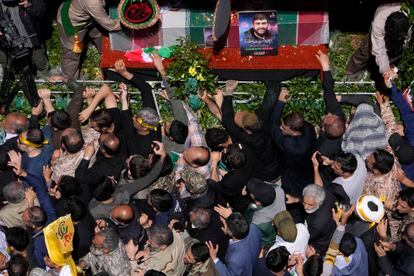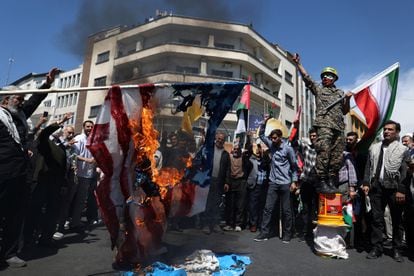Iran celebrates Al Quds (Jerusalem) Day on this day, which on the last Friday of the month of Ramadan serves each year as a show of support for Palestine and rejection of Israel. Tehran also hosts on this day the funeral procession of the seven members of the Islamic Revolutionary Guard Corps, including Mohammad Reza Zahedi and two other senior military officials, who perished on Monday in an Israeli bombing of the residence of the Iranian ambassador in Damascus ( Syria). During that celebration, the commander in chief of the Revolutionary Guard, General Hosein Salamí, has raised the threat against Israel, of which he has said that he “will be buried in Gaza,” Efe reports. Hundreds of thousands of Iranians have paraded through the streets of Tehran while shouting the chants that always accompany official demonstrations in Iran: “Death to the United States” and “Death to Israel.” In Lebanon, Hassan Nasrallah, the leader of the Shiite militia party and close ally of Iran Hezbollah, has added to that threatening tone. In a televised speech, he defined the Israeli bombing of the Iranian diplomatic residence as “a turning point” in the conflict.
The threat issued by General Salami comes as fear that Iran will fulfill its promise to take revenge on Israel for the murder of Zahedi, one of the main Iranian military commanders in Syria, and ten other people has pushed many Israelis to rush to the shops and shopping centers to purchase canned goods, water and electricity.
Although the Army spokesman, Daniel Hagari, appeared this Thursday to reassure his population and remember that the military instructions for citizens “had not changed”, as usually happens in a scenario of war attack, the Israeli authorities themselves are showing of concern about possible retaliation from Iran. The newspaper Times of Israel reports this Friday that 28 Israeli embassies around the world remain closed for fear of an attack by the Islamic Republic that has ruled Iran since 1979.
The bombing that killed Zahedi, considered one of the most prominent Iranian military commanders in Syria, was also preceded three days earlier, last Friday, by another attack, the deadliest since 2021 in Syria. In that first bombing near the Damascus airport, about 40 people died. The Iranian Foreign Minister, Hossein Amir Abdollahian, immediately blamed Israel for the “consequences” that this event could have. After the death of senior members of the Revolutionary Guard on Monday, the president of Iran, the ultra-conservative Ibrahim Raisi, in turn promised that the country he considers his nemesis would pay a “heavy price.”
Join EL PAÍS to follow all the news and read without limits.
Subscribe
The usual rhetoric of the Iranian authorities, which has anti-Israel diatribes as one of its pillars, makes it difficult to discern whether these threats will translate into a regional extension of the Gaza war or if they are simply framed in a discourse for domestic consumption, intended to the part of Iranian public opinion that supports its regime and shares its rejection of Israel. The seriousness of the attack against the residence of the Iranian ambassador – considered sovereign territory of the State he represents, like all diplomatic headquarters – raises fears, on the one hand, that on this occasion the threats will actually result in an escalation of war.
On the other hand, the restraint that the Iranian authorities have shown since the beginning of the Gaza war, six months ago, points in the opposite direction. Despite uttering all kinds of threats, Tehran has contented itself in this half-year of Israel's war conflict in Gaza with continuing with its policy of indirectly attacking Israeli interests by providing support to related non-state actors in the region, such as Hezbollah in Lebanon, the Houthis in Yemen and various pro-Iranian militias in Iraq. This fact suggests that Iran has no interest in getting directly involved in an open war with Israel, which, in addition, would probably obtain military support from its ally the United States. In his speech, Nasrallah, the leader of Hezbollah, predicted that Iranian retaliation “will come” and could take place in different locations, citing Damascus or Beirut.
Israeli Prime Minister Benjamin Netanyahu warned Iran this Thursday that his country will know how to “defend itself”: “We will act according to the basic principle that we will harm anyone who harms us or plans to harm us.”

In January 2020, when a US missile killed General Qasem Soleimaini, commander of the Al Quds Force, the regional arm of the Revolutionary Guard, who was considered one of the most powerful men in Iran, Tehran simply attacked in Baghdad. with missiles at US bases in Iraq without causing fatalities. Military sources in Washington then revealed that Iran had previously warned the Iraqi government of the attack, which, in turn, alerted Washington. The operation was seen as a strategy designed to save the face of the Islamic regime while avoiding direct confrontation with the United States.
Crisis
With this background, a direct Iranian attack against Israeli territory seems unlikely. It is more likely that Iran will respond in some way to the death of senior members of the Revolutionary Guard in Syria, for example, with the bombing of an Israeli embassy abroad. The Netanyahu Government does not rule out this scenario in light of the reinforcement of the security of its embassies to which the newspaper alluded this Friday. Times of Israel.
The Tehran regime is also mired in a
deep crisis of legitimacy vis-à-vis its own population. The abyss between the Islamic Republic and many Iranians is the product of the lack of freedoms and an economic crisis that, to cite one piece of information, translates into inflation of 56%, according to the latest official data. This loss of support among a part of the citizenry was also deepened by the repression of the demonstrations caused by the death in police custody, on September 16, 2022, of the young woman Yina Mahsa Amini, 22, arrested for wearing the veil. mandatory “inappropriately”.
More than 500 people died then at the hands of security forces and paramilitaries affiliated precisely with the Revolutionary Guard; At least 22,000 were detained and nine men have so far been hanged in connection with the protests. In this context, a war with Israel and, above all, with the United States, could deal an already mortal blow to a regime that, in the last legislative elections—without opposition candidates—recorded the highest abstention in its history. Only 41% of Iranian voters cast their vote.
In a speech delivered this Thursday by the supreme leader of Iran, Ali Khamenei, the ayatollah dedicated a few seconds to Israel and several minutes to veiled threats to the Iranian women who, since those protests, have dispensed with the veil. Some social media users ironically claimed that Tehran is going to declare war on Iranian women who disobey the law that requires them to wear the hijab.

Follow all the international information on Facebook and xor in our weekly newsletter.
Subscribe to continue reading
Read without limits
_
#Iran #threatens #bury #Israel #Gaza #response #attack #embassy #Damascus
